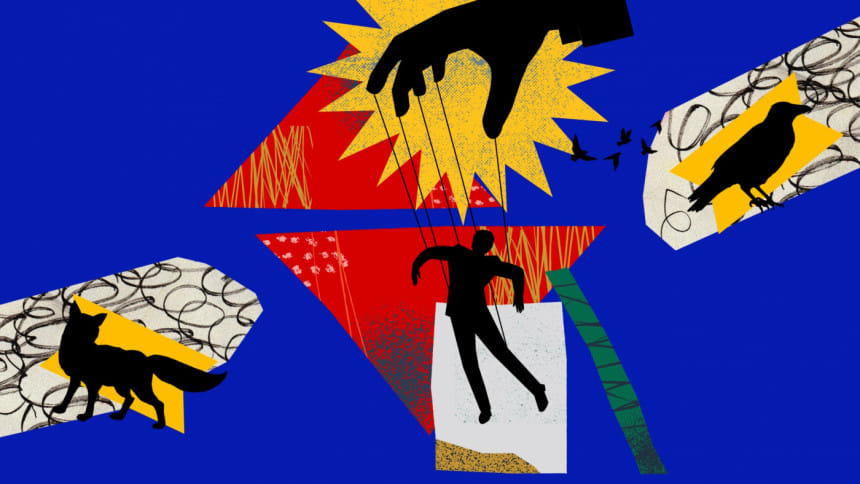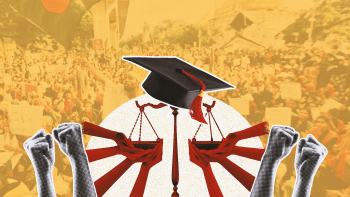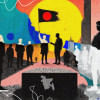Jack and the Beanstalk revisited

There was this picture of a majestic swan held by a young boy who raided Gono Bhaban on the day of the fall of the Awami League regime. The boy was among the many enthusiasts who stormed the former prime minister's residence—maybe out of curiosity or out of the passion to collect a memento of the day in which our political history changed forever. I write "forever" with a pinch of caution, as one lesson we have learnt recently is that nothing lasts forever. Then again, there are situations in life that recur in history and form a pattern in our collective consciousness.
The reference to the boy with the swan came up in my folklore class recently. Didn't the picture remind us of Jack and the Beanstalk? It is the story in which a naive English boy sells his cow to a trickster for some magical beans. The beans sprout to reach the sky, and the boy climbs up the beanstalk through the clouds to enter the land of the giants. He kills a giant and steals his goose that lays golden eggs. The story disguises colonialism. It glorifies the adventurism of White men and normalises their pillage and pilfering. Shakespeare used the famous rhyme, "Fee-fi-fo-fum/I smell the bones of an Englishman," in his play King Lear, highlighting the story's Englishness. Norse mythology is the source of one version of the story, which involves giant plants and giant-slaying, while various English colonies in Australia and the Caribbean contain other versions, making the story universal.
In contrast, the boy with the former prime minister's swan has a rather local and factual heritage, unless we think of him as one of the actors who slay the metaphorical giants of fascism. He was one of those who stole frozen fish from the freezer, chased deer in the garden, snatched rabbits from the cage. The list goes on. On that day, a defiant reclaiming of ownership marked the seizure of the then PM's personal property. Narratives clashed to establish who the bigger thief was. Even when ordinary citizens intervened to stop some of the looters, the perpetrators responded by asking, "Where were you in the last 15 years when the country was being plundered?" A valid question. We were part of a system where the only means of punishing a politician's wrongdoings was through the national election. We lost that opportunity as there was no democratic method to intervene and penalise the wrongdoers. The mass uprising was, therefore, inevitable. Change was achieved through numerous sacrifices. However, we are finding changemakers in different roles, prompting us to re-examine some of the fundamental cultural and moral questions.
These issues pertain to the significant social fragmentation and self-serving ambitions prevalent in our contemporary society. Parallels between our present climate and the enduring themes of our folk culture are unmistakable. The folk tales, riddles and rhymes that are passed down generations depict a world where the clever triumph over the righteous and deception, rather than honour, often leads to success. Is it possible that, layered in our collective psyche, we nurture secret admiration for these cultural heroes who don't necessarily conform to social norms? Is it possible to consider our present political climate as an extension of our ancient legacy?
The way the former prime minister left the scene serves as a reminder of Tonatuni (tailorbird), who gathered all the ingredients to make a cake and consumed it all by themselves. The jungle animals were invited to celebrate; they assumed they would receive their fair share of the cake. When they arrived at the empty house, all they found were a few relics. I always questioned the rationale behind teaching our young learners the Tonatuni story, which extols the cunning of tricksters who prioritise wit and cunning over fairness or justice. After August 5, I knew this story had prepared us for history.
We grew up with many such stories, like Gopal Bhar, about a court jester famous for his sharp wit and roguish pranks. Gopal manipulates people, dodging rules and social decorum to resolve conflicts in a comical manner. His behaviour frequently stretches beyond mere mischief into deception and manipulation. We laugh, but deep down, there is a hidden admiration and approval for such deception. Is there any connection between our folkloric fascination with trickery and our public endorsement of such behaviour by our leaders? According to Carl Jung's terminology, the universal nature of folklore reveals certain shared symbols and archetypes that connect to our collective unconscious. These animals or similar figures rely on their cunningness to outwit stronger opponents.
The Native American prairie dog Coyote, for instance, uses trickery to teach moral lessons to his clan. His misadventures often cause chaos, but they chart human values. These characters, spanning continents and centuries, all share a single trait: they break the rules and upend established norms with impunity. The boy with the swan offered an epiphanic moment: a part of us, inherited through such tales and lore, harbours an instinctive desire for rule-breaking, and a willingness to overlook moral ambiguity if it means personal gain. Tales of sheyal mama (Uncle Fox) or boka kumir (the Foolish Crocodile) tap into a side of our psyche that perhaps senses the power dynamics in society—the need to outwit others to survive, a sentiment that is echoed in our modern culture's often uncritical acceptance of self-promotion and individualism at any cost. Let's not forget that, as a race, we inherit the notorious legacy of thuggery. English reformer Lord Bentick strongly stalled the rampant thugs of Bengal, who used scarves to strangle their victims. The gangs of Mohammadpur live up to the old reputation of thugs. We need the intervention of reformers to put a stop to this.
Political and criminal agents often act as "disrupters," implying that disruption, even in a ruthless or unethical way, is a virtue. It's not surprising that there is a growing culture of disrupters in our educational institutions. Students, frustrated with a lack of faith in the system, are taking matters into their own hands, seeking immediate satisfaction rather than long-term ethical grounding. Nobody wants failure. Everyone seeks "auto pass" without any opposition. It is as if their survival depends on the annihilation of the other. Rather than liberating the swan from the giant's grasp, they aim to take advantage of it, much like Jack in the fairytale. Rather than ignoring this tendency in our collective psyche, perhaps it's time we confronted it, questioned its role in our society, and, most importantly, sought ways to transform these energies into forces that serve the common good.
Dr Shamsad Mortuza is professor of English at Dhaka University.
Views expressed in this article are the author's own.
Follow The Daily Star Opinion on Facebook for the latest opinions, commentaries and analyses by experts and professionals. To contribute your article or letter to The Daily Star Opinion, see our guidelines for submission.

 For all latest news, follow The Daily Star's Google News channel.
For all latest news, follow The Daily Star's Google News channel. 









Comments